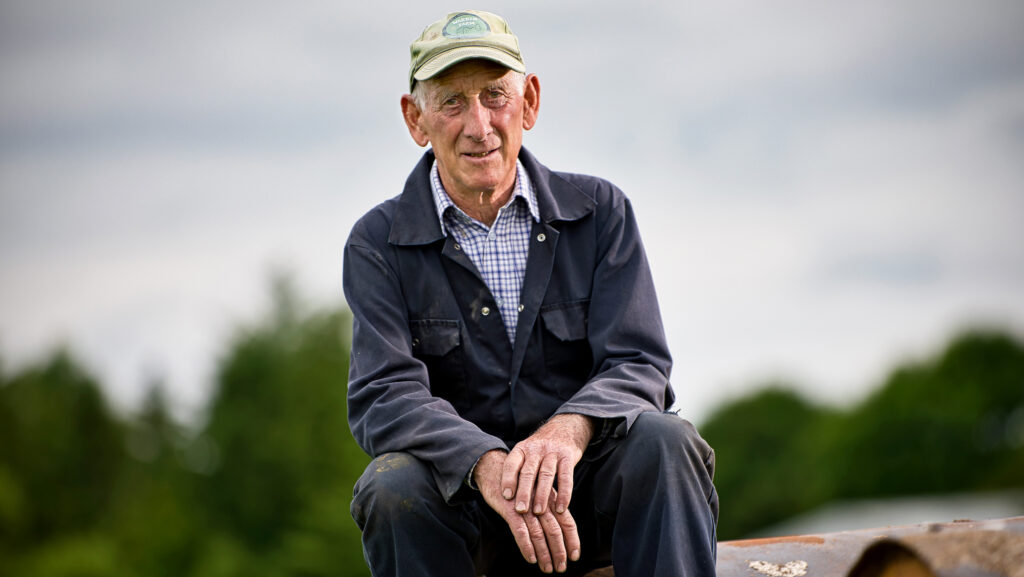Video – 90 and Counting: Somerset sheep farmer John Small
 John Small © Richard Stanton
John Small © Richard Stanton Somerset sheep farmer John Small was born in the 1940s and has been farming in the Mendips for 60 years.
He takes us on a journey through the decades as part of FW’s 90th anniversary celebrations marking the enduring nature of farming generations through the decades since the first issue published in 1934.
See also: 90 and Counting: 92-year-old Fred Campling’s farming life
Watch the full interview with John in the video below.
Warren Farm is an upland farm roughly 950ft above sea level. The family’s been here since 1945.
My grandfather was farming during the depression, which was difficult times. But he had a large family, mostly sons, and the opportunity to take on farms that literally just were not wanted.
Some of the farms around here were empty for two or three years. He had started off with, as he would say, “half a crown in a matchbox”, and his sons were expected to start on their own. They all worked for no wages.
At the age of 24, my father had the opportunity in 1945 to rent this farm, which he did.
My brother and I really took on the farming side of it at a very early age, missing a lot of school time. We both left when we were 14 years old and we were more or less running the farm at that time.
For us today, the farming year starts in September when the lambs are weaned and we are sorting out which sheep we’re going to keep, what sort of rams we’re going to use, and so on.
Winter is probably my worst time. It’s now usually wet; sheep don’t like it wet. May is my favourite time – I do like lambing the sheep. I don’t know why; it’s long hours. I start at 5am and don’t usually finish before 10pm.
Then you have the uncertainty. Is it going to be a good haymaking time? Are the lambs going to go on and do well? It’s that “not knowing” I really like.
On technology…
Farm work used to be far more physical. Now you have the modern machinery. Everyone still works long hours, but they’ve got a heated cab. We had an open tractor – or as I say, the horse.
One horse we used for haymaking had been trained to work in the rows of strawberry fields in Cheddar.
A 40-acre field he’d do in about four hours without stepping on the hay. In a remarkable way it was quite efficient.
Who would have thought of GPS and all that sort of thing? We thought it was amazing when they put a cab on a tractor.
On farm finances…
We started buying suckler cows in 1966 from Bodmin Moor in Cornwall and arranged an annual sale, which we had on the farm here.
In 1973 it became obvious there was going to be difficulty getting the money as the financial crisis was hitting the auctioneers as well.
The base rate went up to 18%, we’d borrowed a load of money to buy the cattle and sheep, and the money wasn’t forthcoming.
Eventually, the bank took them over and we got our money in April but it was a difficult time. It meant a lot of outside work lorry driving, mostly at night and weekends, but we got through it.
A fleece then would have been around £4 and a new four-cylinder tractor would be 130 fleeces. The current hill price is down to 5p/kg so it would take several thousand sheep to buy a tractor now.
On succession…
One of the biggest problems with family farms is the future, succession, how it’s going to work. I am a great believer in being open.
All parties know where they are, what my wishes are and what’s going to happen.
What I see often is it’s all left, put off to another day. Suddenly it becomes necessary, nobody knows where they are, no one trusts one another and it all goes pear-shaped.
For anyone starting farming now, forget the tradition and think of the new. Take advantage of the present fashion for land improvement through animals, get a shared partnership.
You’ve got to have a big wodge of optimism because things will go wrong. That’s what farming has always been.
1940s fact file
1941 Farmers were told not to burn hedge trimmings after blackout in case they attracted enemy bombers
1943 Land Girls spearheaded an ambitious land drainage programme carried out across thousands of acres in south Warwickshire
1945 Mechanisation came to Calf Island in the form of a Fordson tractor. The tiny island south of the Isle of Man had no harbour, so the machine had to be dismantled for delivery
1947 The Agriculture Act offered guaranteed prices and assured markets for farmers’ produce, although farmers were left less than impressed with the reality
Source: Farmers Weekly
